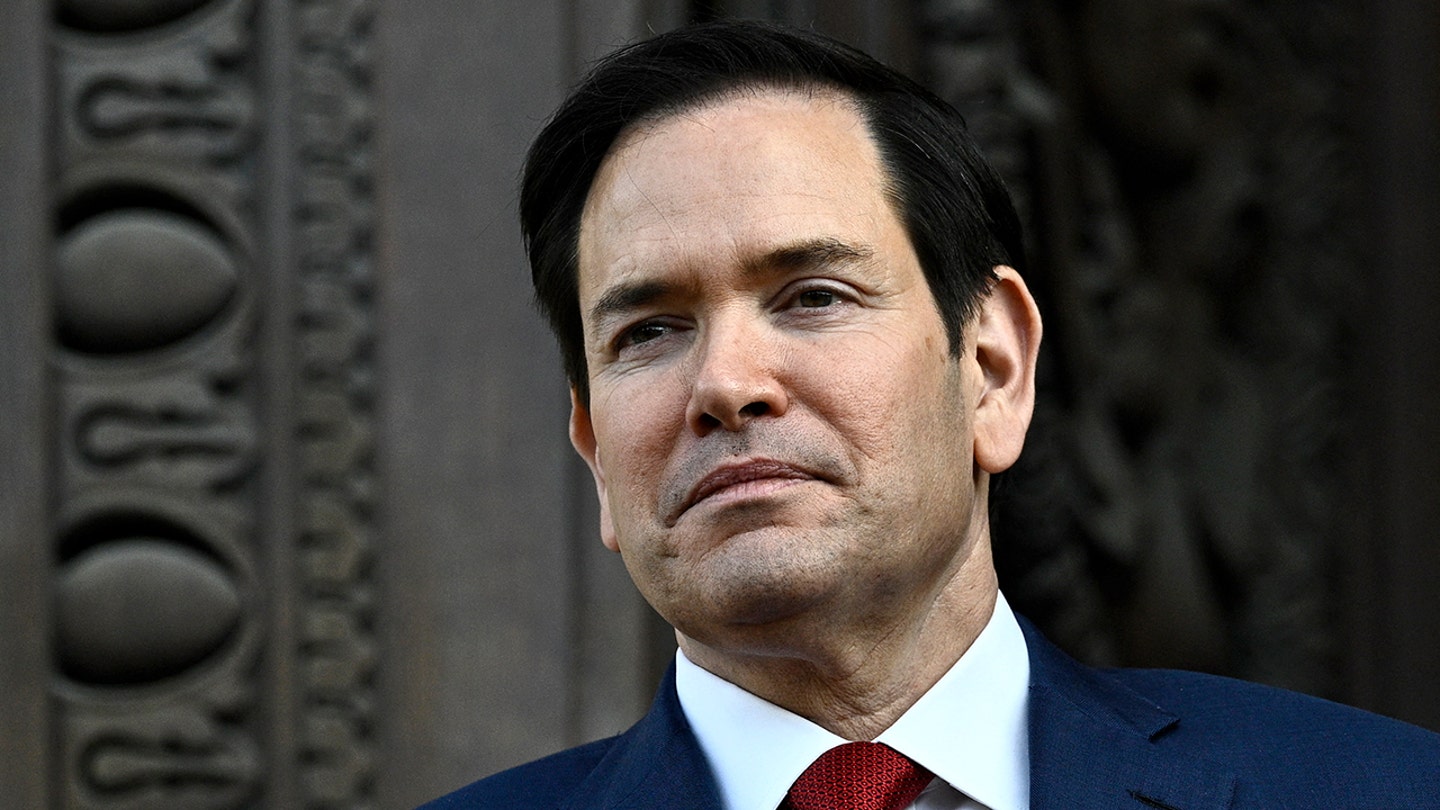
House Democrats call on Rubio to allow injured children from Gaza into US following visa halt
Entities mentioned:
- House Democrats: Moral outrage, Justice, Compassion
- Trump administration: Security, Control, Wariness
- Marco Rubio: Security, Duty, Wariness
- State Department: Security, Control, Duty
- Hamas: Power, Control, Influence
- Israeli government: Security, Control, Self-preservation
Article Assessment:
Credibility Score: 75/100
Bias Rating: 40/100 (Lean Left)
Sentiment Score: 35/100
Authoritarianism Risk: 45/100 (Mixed/Neutral)
Bias Analysis:
The article leans slightly left, giving more space to Democratic concerns and humanitarian arguments. While it includes Rubio's perspective, it frames the visa halt more critically and emphasizes the potential negative impact on children needing medical care.
Key metric: US Foreign Policy Effectiveness
As a social scientist, I analyze that this article highlights a conflict between humanitarian concerns and national security interests in US foreign policy. The decision to halt visas for Gaza residents, including children needing medical care, demonstrates a prioritization of security concerns over humanitarian aid. This policy shift could impact the US's global image and its ability to balance hard and soft power in international relations. The congressional pushback indicates internal disagreement on the appropriate balance between security and humanitarian considerations, which could lead to policy adjustments. The situation also underscores the complex interplay between domestic politics, international relations, and humanitarian issues in US foreign policy decision-making.

Federal judge blocks Abrego Garcia deportation, extending court fight
Entities mentioned:
- Judge Paula Xinis: Justice, Duty, Obligation
- Trump administration: Control, Power, Security
- Kilmar Abrego Garcia: Self-preservation, Freedom, Security
- Immigration and Customs Enforcement (ICE): Duty, Control, Security
- Drew Ensign: Duty, Professional pride, Loyalty
Article Assessment:
Credibility Score: 75/100
Bias Rating: 45/100 (Center)
Sentiment Score: 40/100
Authoritarianism Risk: 35/100 (Generally Democratic)
Bias Analysis:
The article presents a balanced account of the legal proceedings, including perspectives from both the judge and the Justice Department. While it provides more detail on the arguments against deportation, it also includes the administration's position, maintaining a relatively neutral stance.
Key metric: Immigration Enforcement Effectiveness
As a social scientist, I analyze that this case highlights the ongoing tension between the Trump administration's aggressive immigration enforcement policies and the judicial system's role in ensuring due process. The judge's decision to block the deportation reflects a concern for proper legal procedures and potential human rights issues. This case may impact the administration's ability to quickly deport individuals to third countries, potentially affecting overall deportation rates and the perceived effectiveness of immigration enforcement policies. The involvement of Uganda as a potential deportation destination introduces new complexities to U.S. immigration practices, potentially setting precedents for future cases.

Pirro’s office fails three times to win felony indictment of alleged attacker of FBI agent
Entities mentioned:
- Jeanine Pirro: Power, Control, Loyalty
- Sydney Lori Reid: Self-preservation, Fear, Indignation
- US Attorney's Office: Justice, Control, Professional pride
- Grand Jury: Justice, Duty, Wariness
- Trump Administration: Control, Power, Law and order
- Federal Public Defender's Office: Justice, Duty, Protection of rights
Article Assessment:
Credibility Score: 75/100
Bias Rating: 45/100 (Center)
Sentiment Score: 35/100
Authoritarianism Risk: 40/100 (Generally Democratic)
Bias Analysis:
The article presents multiple viewpoints, including those of the prosecution and defense. While it highlights issues with the Trump administration's approach, it also provides space for the US Attorney's perspective, maintaining a relatively balanced stance.
Key metric: Criminal Justice System Effectiveness
As a social scientist, I analyze that this article highlights significant challenges in the criminal justice system under the Trump administration's aggressive law enforcement approach. The repeated failure to secure a grand jury indictment for a felony charge, which is typically easy to obtain, suggests potential overreach or weak evidence in the prosecutor's case. This situation reflects broader tensions between the administration's tough-on-crime stance and the checks and balances within the justice system. The shift from pursuing felony charges to misdemeanor charges after multiple grand jury rejections indicates a possible misalignment between the prosecutor's goals and the evidence available, potentially impacting the overall effectiveness and fairness of the criminal justice process.

Trump asks Supreme Court to step in and block billions in foreign aid spending
Entities mentioned:
- Trump administration: Control, Power, Influence
- Supreme Court: Justice, Duty, Influence
- Department of Justice: Duty, Loyalty, Control
- US Court of Appeals for the DC Circuit: Justice, Duty, Influence
- Congress: Power, Control, Duty
- State Department: Duty, Influence, Control
- USAID: Duty, Influence, Unity
Article Assessment:
Credibility Score: 75/100
Bias Rating: 55/100 (Center)
Sentiment Score: 40/100
Authoritarianism Risk: 35/100 (Generally Democratic)
Bias Analysis:
The article presents a balanced view of the legal dispute, including perspectives from both the Trump administration and the lower courts. While it quotes more extensively from the administration's filing, it also provides context about previous court decisions and the ongoing nature of the dispute.
Key metric: US Foreign Aid Spending
As a social scientist, I analyze that this article highlights a complex legal battle between the executive and legislative branches over control of foreign aid spending. The Trump administration's attempt to block billions in foreign aid reflects a shift in US foreign policy priorities and could significantly impact America's global influence and diplomatic relationships. The case raises questions about the balance of power between different branches of government and the role of the judiciary in settling such disputes. The potential rapid obligation of $12 billion in foreign aid funds, if the Supreme Court doesn't intervene, could have far-reaching consequences for US foreign policy implementation and international commitments.

Judge tosses Trump administration’s lawsuit against Maryland’s 15 federal judges, calling it a ‘constitutional free-for-all’
Entities mentioned:
- Judge Thomas Cullen: Justice, Duty, Righteousness
- Trump administration: Power, Control, Self-preservation
- Justice Department: Control, Power, Righteousness
- Maryland federal judges: Duty, Justice, Professional pride
- Kilmar Abrego Garcia: Self-preservation, Security, Freedom
Article Assessment:
Credibility Score: 75/100
Bias Rating: 45/100 (Center)
Sentiment Score: 35/100
Authoritarianism Risk: 65/100 (Authoritarian Tendencies)
Bias Analysis:
The article presents both sides of the issue, quoting from the judge's ruling and describing the administration's position. While some language choices may slightly favor the judicial perspective, the overall presentation is balanced and fact-based.
Key metric: Rule of Law Index
As a social scientist, I analyze that this case represents a significant challenge to the separation of powers and judicial independence in the United States. The Trump administration's attempt to sue federal judges for their rulings on immigration cases is an unprecedented move that could potentially undermine the judiciary's role in providing checks and balances. Judge Cullen's dismissal of the case reinforces the importance of judicial immunity and the proper channels for addressing concerns between branches of government. This ruling likely strengthens the Rule of Law Index by maintaining the integrity of the judicial system against executive overreach. However, the administration's rhetoric and actions against judges who rule against it may have longer-term negative impacts on public trust in the judiciary and the overall strength of democratic institutions.

Abrego Garcia renews bid for asylum as fight over Trump admin’s attempt to re-deport him heats up
Entities mentioned:
- Kilmar Abrego Garcia: Self-preservation, Security, Justice
- Trump administration: Control, Power, Righteousness
- Justice Department: Duty, Control, Justice
- MS-13: Power, Control, Fear
Article Assessment:
Credibility Score: 75/100
Bias Rating: 40/100 (Lean Left)
Sentiment Score: 35/100
Authoritarianism Risk: 65/100 (Authoritarian Tendencies)
Bias Analysis:
The article leans slightly left, presenting Abrego Garcia's case sympathetically and emphasizing potential rights violations. While it includes the administration's perspective, it gives more space to arguments supporting Abrego Garcia's asylum bid.
Key metric: Immigration Court Backlog
As a social scientist, I analyze that this case highlights the complexities and contradictions in the U.S. immigration system. The renewed asylum bid by Abrego Garcia represents a challenge to the Trump administration's aggressive deportation policies, potentially impacting the Immigration Court Backlog. The case underscores tensions between national security concerns, human rights obligations, and due process in immigration proceedings. The wrongful deportation and subsequent legal battles reflect systemic issues in immigration enforcement and the potential for rights violations. This case may set precedents for similar cases and influence public perception of immigration policies.

DOGE put Americans’ Social Security records at risk, whistleblower says
Entities mentioned:
- Department of Government Efficiency: Efficiency, Duty, Professional pride
- Social Security Administration: Security, Duty, Professional pride
- Charles Borges: Duty, Righteousness, Security
- Government Accountability Project: Justice, Transparency, Duty
- Office of Special Counsel: Justice, Duty, Security
- Trump administration: Power, Control, Influence
- Elon Musk: Ambition, Influence, Control
- DOGE team: Efficiency, Control, Influence
- Supreme Court: Justice, Duty, Control
- Nick Perrine: Professional pride, Security, Duty
Article Assessment:
Credibility Score: 75/100
Bias Rating: 45/100 (Center)
Sentiment Score: 25/100
Authoritarianism Risk: 35/100 (Generally Democratic)
Bias Analysis:
The article presents multiple perspectives, including the whistleblower, the agency, and concerned groups. It maintains a neutral tone while reporting on a controversial issue, balancing criticism with official responses.
Key metric: Data Security and Privacy
As a social scientist, I analyze that this article highlights a significant breach in data security practices within a major government agency, potentially affecting millions of Americans. The whistleblower's complaint suggests a systemic failure in protecting sensitive personal information, which could have far-reaching consequences for individual privacy and national security. The involvement of private sector entities (DOGE team) in accessing government data raises questions about the balance between modernization efforts and data protection. This situation reflects broader tensions between technological advancement, government efficiency, and the safeguarding of personal information in the digital age. The response from the Social Security Administration appears to downplay the severity of the issue, which may indicate a disconnect between internal perceptions of security and actual vulnerabilities. This incident could lead to decreased public trust in government institutions and their ability to protect citizens' data, potentially impacting social cohesion and civic engagement.

House Republicans give California medical schools two-week deadline in antisemitism probe
Entities mentioned:
- House Republicans: Justice, Power, Control
- Tim Walberg: Righteousness, Duty, Control
- University of California Los Angeles: Self-preservation, Obligation, Professional pride
- UC San Francisco: Self-preservation, Obligation, Professional pride
- University of Illinois College of Medicine: Self-preservation, Obligation, Professional pride
- Trump administration: Justice, Power, Control
- Department of Justice: Justice, Duty, Control
Article Assessment:
Credibility Score: 75/100
Bias Rating: 55/100 (Center)
Sentiment Score: 30/100
Authoritarianism Risk: 35/100 (Generally Democratic)
Bias Analysis:
The article presents multiple viewpoints, including those of Republican lawmakers, university administrators, and affected students. While it gives more space to the Republican perspective, it also includes university responses, suggesting a relatively balanced approach.
Key metric: Civil Rights Enforcement
As a social scientist, I analyze that this article highlights a growing concern over antisemitism in higher education institutions, particularly in medical schools. The involvement of House Republicans and the Trump administration in investigating and penalizing universities suggests a heightened federal focus on civil rights enforcement, specifically regarding discrimination against Jewish students. This increased scrutiny and potential financial penalties could lead to more rigorous anti-discrimination policies and practices in universities, affecting the overall climate for minority students and the enforcement of civil rights laws in educational settings. The demand for extensive documentation and the substantial financial penalties proposed indicate a shift towards more aggressive federal intervention in university affairs related to discrimination issues.

Federal judge orders closure of Trump’s ‘Alligator Alcatraz’ immigration jail
Entities mentioned:
- Donald Trump: Power, Control, Legacy
- Federal judge: Justice, Duty, Righteousness
- Immigration and Customs Enforcement (ICE): Control, Security, Duty
- Trump administration: Power, Control, Influence
- US military: Duty, Security, Obligation
- Pentagon: Security, Duty, Control
- ACLU: Justice, Freedom, Moral outrage
Article Assessment:
Credibility Score: 65/100
Bias Rating: 35/100 (Lean Left)
Sentiment Score: 30/100
Authoritarianism Risk: 65/100 (Authoritarian Tendencies)
Bias Analysis:
The article leans left in its framing, focusing on challenges to Trump administration policies and highlighting opposition. While it presents factual information, the selection of stories and language used suggests a critical stance towards the administration's actions.
Key metric: Immigration Enforcement Effectiveness
As a social scientist, I analyze that this article highlights significant tensions between the Trump administration's aggressive immigration policies and judicial oversight. The closure of the 'Alligator Alcatraz' immigration jail by a federal judge suggests a pushback against what may be perceived as overly harsh or potentially unconstitutional detention practices. This decision, along with other reported actions such as cutting California's sex-education funds over gender identity references and the military identifying 'hotels to avoid' due to protests, indicates a pattern of resistance to the administration's policies from various sectors including the judiciary, state governments, and civil society. The involvement of the Pentagon in asking civilian employees to aid ICE deportations further underscores the administration's commitment to its immigration agenda, potentially blurring lines between civilian and military roles in domestic law enforcement. This could have significant implications for the effectiveness and public perception of immigration enforcement efforts, potentially leading to increased polarization and legal challenges.

Judge halts Trump administration from deporting Kilmar Ábrego García for now
Entities mentioned:
- Trump administration: Control, Power, Security
- Kilmar Ábrego García: Self-preservation, Security, Freedom
- Judge: Justice, Duty, Righteousness
Article Assessment:
Credibility Score: 70/100
Bias Rating: 35/100 (Lean Left)
Sentiment Score: 40/100
Authoritarianism Risk: 30/100 (Generally Democratic)
Bias Analysis:
The article leans slightly left, evident in the framing of Trump administration actions as aggressive and the focus on judicial checks. However, it presents factual information about the court decision without overtly partisan language.
Key metric: Immigration Enforcement Effectiveness
As a social scientist, I analyze that this article highlights ongoing tensions between the Trump administration's aggressive immigration policies and judicial checks on executive power. The judge's decision to halt the deportation temporarily suggests a potential conflict between the administration's goals and legal protections for immigrants. This case could have broader implications for the effectiveness and legality of current immigration enforcement strategies, potentially impacting the overall metric of Immigration Enforcement Effectiveness.